Objective: Unhealthy lifestyles and eating habits, as well as psychological abnormalities, may play important roles in laryngopharyngeal reflux. Although changes to these risk factors are considered the first-line treatment for laryngopharyngeal reflux, there is no strong evidence to support the recommendation. Here, we examined the relationships between the above factors and laryngopharyngeal reflux.
Methods: We conducted a cross-sectional survey (ChiCTR-RRC-17012536) at the digestive endoscopy centers of 3 hospitals and recruited 320 participants (patients with laryngopharyngeal reflux: n=123; control group: n=197). All participants underwent gastroscopy and routine otolaryngology and completed the relevant questionnaires.
Results: No significant differences were observed between groups in terms of age, sex, marriage, body mass index, work, education, smoking, drinking, lying down immediately after meals, and lack of physical activity. Preferences for acidic food, porridge or soup, coffee drinking, an unbalanced diet, overeating, fasting, pre-bedtime dinner, anxiety, and depression were related to laryngopharyngeal reflux according to univariate logistic regression analysis (all P < .05). Multivariate logistic regression analysis revealed that drinking coffee, overeating, fast eating, dinner just before bedtime, anxiety, and depression were independent risk factors for laryngopharyngeal reflux (all P < .05, odds ratios 1.133, 1.172, 1.155, 1.345, 1.874, and 2.065, respectively). The anxiety score but not the depression score was positively correlated with the Reflux Symptom Index score (Spearman’s r=0.627, P < .001).
Conclusion: Certain adverse lifestyle factors, unhealthy eating habits, and mental factors (anxiety and depression) were related to the occurrence of laryngopharyngeal reflux.
Cite this article as: Chen G, Kuang X, Wang X, et al. Psychological factors, lifestyles, and habits of patients with laryngopharyngeal reflux: A multicenter survey. B-ENT. 2023;19(3):170-174.



.png)
